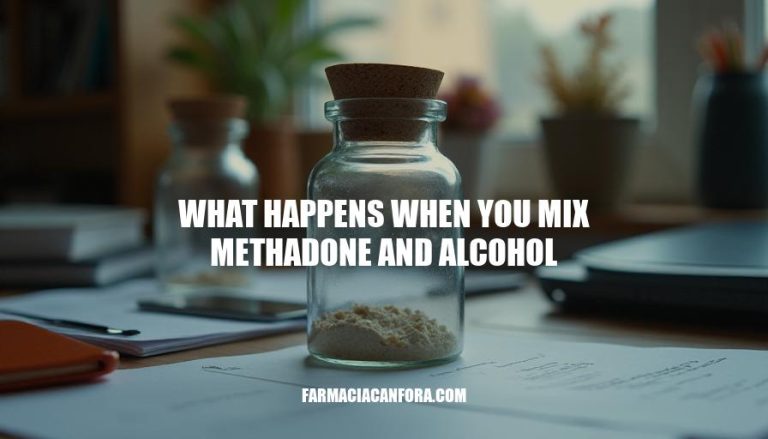


Methadone and alcohol don’t mix well. Methadone is a medicine that helps people with opioid addiction feel better. Alcohol can affect how methadone works in your body, and it’s not always predictable.
This article will look at what happens when you take both together, so we can understand the risks and stay safe.
Methadone is a long-acting opioid used to treat pain and opioid dependence. As a synthetic opioid agonist, it works by binding to the same brain receptors as other opioids, but without causing the same euphoric high. This helps reduce withdrawal symptoms and cravings in people addicted to heroin or other narcotics.
It can also be prescribed for chronic pain management. Methadone is administered as an oral solution, tablet, or injectable form. It provides a slow onset of action, creating a prolonged effect which helps stabilize patients and reduce the potential for abuse.
In the body, methadone is metabolized by the liver and excreted primarily through the urine.
Combining methadone and alcohol can lead to profound physiological effects due to their interaction as central nervous system depressants. Methadone, an opioid used for pain management and opioid addiction treatment, and alcohol both depress the central nervous system, which can amplify their effects.
When taken together, methadone and alcohol can cause severe respiratory depression, leading to slow or shallow breathing. This can result in dangerously low oxygen levels in the body, potentially causing brain damage or death.
Additionally, the combination can lead to extreme drowsiness, dizziness, and impaired motor control, increasing the risk of accidents and injuries.
The interaction can also cause cardiovascular issues, such as low blood pressure and a weak heart rate, which can be life-threatening. In severe cases, combining these substances can lead to coma or even death due to respiratory failure or cardiovascular collapse.
Moreover, the combination does not eliminate the side effects of each substance individually. Users may experience anxiety, insomnia, weakness, sweating, nausea, vomiting, and seizures.
The risk of overdose is significantly increased, as the sedative effects of both substances can be unpredictable and overwhelming.
It is crucial to avoid combining methadone and alcohol to prevent these dangerous and potentially fatal complications. If someone is struggling with addiction to both substances, seeking professional medical help and a comprehensive treatment plan is essential.
Mixing methadone and alcohol can lead to severe complications. Both substances are central nervous system depressants, so their combined effects can amplify each other. This can result in dizziness, drowsiness, and impaired motor control.
Respiratory problems, low blood pressure, and a weak heart rate are also common. The risk of overdose increases significantly, potentially leading to coma or death. Additionally, combining these substances can cause anxiety, insomnia, sweating, and vomiting.
Memory problems and changes in behavior and mood may also occur.
Mixing methadone and alcohol can lead to severe respiratory problems, low blood pressure, a weak heart rate, and even coma. Over time, this combination can cause chronic respiratory issues, cardiovascular problems, and severe liver damage. Additionally, the risk of overdose increases significantly, which can result in permanent brain damage or death.
Long-term use can also exacerbate mental health issues such as anxiety, depression, and cognitive impairments.
Mixing methadone and alcohol can lead to severe health issues, including:
Respiratory depression: Both substances depress the central nervous system, which can slow or stop breathing.
Overdose: The combination increases the risk of overdose, which can be fatal.
Low blood pressure: This can cause dizziness, fainting, and even shock.
Weak heart rate: The heart rate can become dangerously slow, leading to cardiac complications.
Coma: High doses can lead to loss of consciousness.
Impaired motor skills: This increases the risk of accidents and injuries.
Severe drowsiness: This can lead to accidents and impair daily functioning.
Nausea and vomiting: Both substances can cause these symptoms, leading to dehydration and electrolyte imbalances.
Sweating and anxiety: These can be uncomfortable and distressing.
Dizziness and weakness: These symptoms can affect balance and coordination.
It’s crucial to avoid mixing these substances to prevent these serious complications.
Mixing methadone and alcohol can lead to severe health issues, including respiratory depression, overdose, low blood pressure, weak heart rate, coma, impaired motor skills, severe drowsiness, nausea and vomiting, sweating and anxiety, and dizziness and weakness.
These complications can be life-threatening and permanent brain damage or death may occur. It is crucial to avoid combining these substances to prevent these serious complications.
If you have any concerns, seek professional medical help and a comprehensive treatment plan.